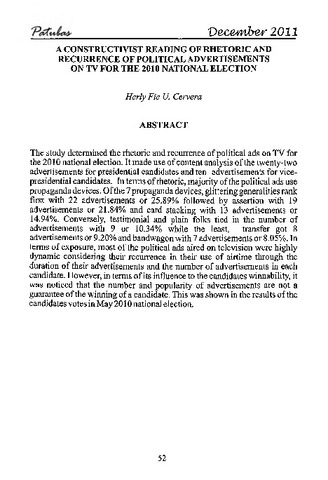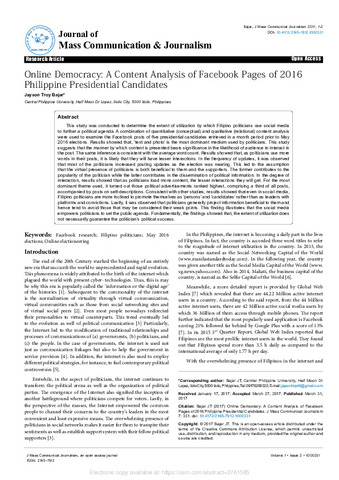Political communications and promotions: Its influence to the voting inclination and preference of perceived candidates of the residents of the city of Iloilo

Page views
2,032Date
2009Author
Thesis Adviser
Defense Panel Chair
Defense Panel Member
Share
Metadata
Show full item record
Abstract
This study aimed to determine the extent of influence of political communication and promotions to the voting inclination and preference of candidates. The research is descriptive-relational as it describes certain characteristics of the respondents and its relation with other variables in the study. To obtain the data needed, a one-shot survey design was used. An interview schedule through a face to face interview was also utilized to get the needed and right information from the 600 respondents with the use of information officers who were assigned to the various district and corresponding barangays of the City of Iloilo. These 600 respondents were randomly chosen from the various barangays that were randomly chosen after proportional distribution of respondents per district was made. After the needed data was obtained, an SPSS program was used to determine frequencies of the data, cross tabulations and correlations of the dependent and independent variables. Furthermore, frequency distribution and computation of means was used for descriptive analysis while Chi-square and Gamma were used for inferential analysis.
Results of the study reveal that there was an almost even distribution of respondents in terms of gender of which two-thirds are married between ages 25-54 and the majority had at least reached high school or college level of education. In terms of their occupation, it seems that most of them are self employed. In terms of political affiliation, most of the respondents consider themselves as independents which are closely followed by those who think of themselves as opposition. The average age of the respondents is 39 years old while the average monthly income is P5,500.00.
Majority of the respondents have never been exposed to political communications of the perceived local and national candidates with political communications. The candidate who had mostly been seen, read or heard by the respondents is Sen. Mar Roxas. On the local level, the person who got the highest percentage of those who always got exposed to his political communications is Sec Gonzales. Many of the qualified voters have not been exposed to political communications and promotions. Furthermore, almost half of the respondents have an unfavorable attitude towards politics while the majority have an unfavorable attitude towards politicians. In general, we can say that respondents' view of politics and politicians are most likely unfavorable.
Results also show that the respondents already have their choice and do not anymore have reserve choices for President, Congressman, Mayor and Councilors except for Vice Mayor. In terms of their Vice Mayor, it is a very close match between two incumbent young City Councilors. For the national candidates, gender, civil status and age are not determining factors in influencing exposure to political communications. On the other hand, occupation, political affiliation, monthly income and educational attainment influence respondents' exposure to national candidates' political communications. For the local candidates, gender, civil status and political affiliation are not determining factors in influencing exposure to political communications. On the other hand, occupation and age are vital factors that influence respondents’ exposure to local candidates’ political communications. It is interesting to note that for monthly income and educational attainment it is not certain if they have influence on one’s exposure to political communications.
Findings for both the local and national candidates also show that there is a significant relationship between extent of exposure to political communications and their attitude towards politics. In terms of respondents’ attitude towards politicians, for those exposed to political communications of national candidates, there is no significant relationship with both while for those exposed to political communications of local candidates, there is a significant relationship between the two variables.
In general, there is a significant relationship between respondents’ attitude towards politics and their voting inclination as well as with their voting preference. On the other hand, there is no significant relationship between respondents’ attitude towards politicians and their voting inclination but it has a significant relationship with their voting preference. There is also a significant relationship between extent of exposure to political communications to both voting inclination and voting preference. On the other hand, for those exposed to local candidates, there is only a significant relationship between extent of exposure to political communications to voting inclination only but not to voting preference. Furthermore, there is a significant relationship between sociodemographic characteristics and attitude towards politicians. On the other hand, there is no significant relationship between socio-demographic characteristics and attitude towards politics.
In general, of all the socio-demographic characteristics studied, only monthly income is a factor that influences one’s voting inclination and only political affiliation is a factor that influences voting preferences.
Description
Abstract only
Suggested Citation
Tupas, N. C. (2009). Political communications and promotions: Its influence to the voting inclination and preference of perceived candidates of the residents of the city of Iloilo (Unpublished Doctoral dissertation). Central Philippine University, Jaro, Iloilo City.
Type
DissertationSubject(s)
Keywords
Department
School of Graduate StudiesDegree
Doctor of Management major in Public ManagementShelf Location
GSL Theses 650.072 T839
Physical Description
xvii, 214 leaves
Collections
Related items
Showing items related by title, author, creator and subject.
-
An analysis of presidential candidates’ Facebook posts during the 2022 Philippine National Election
Palcullo, Vince Ervin V. (Faculty of Arts, Chulalongkorn University, 2023)The 2022 Philippine National Election witnessed a significant shift in political communications and campaigning strategies due to the utilization of Facebook. Utilizing the Facebook posts of Ferdinand “Bongbong” Marcos, ... -
A constructivist reading of rhetoric and recurrence of political advertisements on TV for the 2010 national election
Cervera, Herly Fie U. (Central Philippine University, 2011-12)The study determined the rhetoric and recurrence of political ads on TV for the 2010 national election. It made use of content analysis of the twenty-two advertisements for presidential candidates and ten advertisements ... -
Online democracy: A content analysis of Facebook pages of 2016 Philippine presidential candidates
Bajar, Jayson Troy F. (Hilaris, 2017)This study was conducted to determine the extent of utilization by which Filipino politicians use social media to further a political agenda. A combination of quantitative (conceptual) and qualitative (relational) content ...





